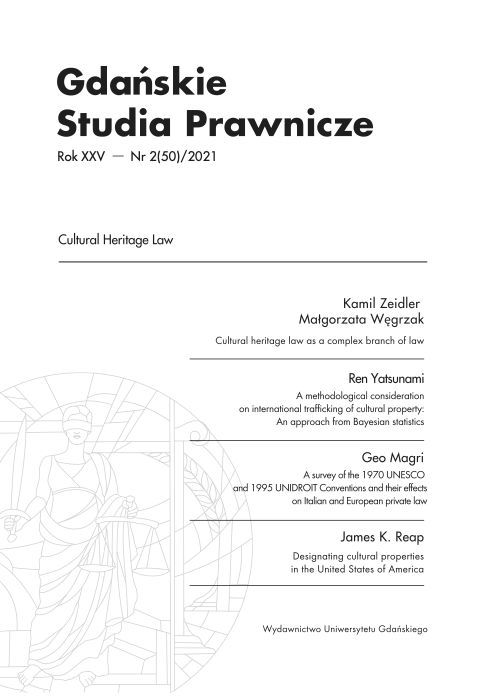Rozważania metodologiczne dotyczące międzynarodowego handlu dobrami kultury – podejście ze statystyki bayesowskiej
DOI:
https://doi.org/10.26881/gsp.2021.2.02Słowa kluczowe:
wnioskowanie bayesowskie, ochrona ruchomych dóbr kulturyAbstrakt
W niniejszym artykule, tematycznie osadzonym w zagadnieniach nielegalnego handlu ruchomymi dobrami kultury, zaproponowano stosowanie narzędzia probabilistycznego znanego jako wnioskowanie bayesowskie w sprawach z zakresu prawa ochrony dóbr kultury. Postulowany model probabilistyczny pokazuje, w jaki sposób można wykorzystać wnioskowanie bayesowskie do oszacowania wpływu materiału dowodowego na całość postępowania w przypadku, w którym organy celne wykryłyby taki właśnie nielegalny handel.
Downloads
Bibliografia
Atwood R., Stealing History: Tomb Raiders, Smugglers, and the Looting of the Ancient World, St. Martin’s Press, New York 2004.
Bazley T.D., Crimes of the Art World, Praeger, Santa Barbara 2010.
Bayes T., Price R., “An Essay towards Solving a Problem in the Doctrine of Chances”, Philosophical
Transactions of the Royal Society of London 1763, vol. 53.
Bernardo J.M., Smith A.F.M., Bayesian Theory, John Wiley and Sons, Chichester 1994.
Boz Z., “Repatriation of Cultural Antiquities Forming a Legal and an Archaeological Procedure”
[in:] 3rd International Conference of Experts on the Return of Cultural Property Athens – Ancient
Olympia, 23–27 October 2013: Proceedings, ed. S. Choulia-Kapeloni, Archaeological Receipts Fund, Athens 2014.
Burman H.S., “International Institute for the Unification of Private law (UNIDROIT): Final Act of the Diplomatic Conference for the Adoption of the Draft Unidroit Convention on the Inter- national Return of Stolen or Illegally Exported Cultural Objects”, International Legal Materials 1995, vol. 34, issue 5.
Ehlert C., Prosecuting the Destruction of Cultural Property in International Criminal Law: With a Case Study on the Khmer Rouge’s Destruction of Cambodia’s Heritage, Martinus Nijhoff, Leiden 2013. Eskander S., “Wars, Uprisings, Invasions, and Terrorism: The Looting and the Recovery of Iraq’s Cultural Property" [in:] 3rd International Conference of Experts on the Return of Cultural Property Athens – Ancient Olympia, 23–27 October 2013: Proceedings, ed. S. Choulia-Kapeloni, Archaeological Receipts Fund, Athens 2014.
Gauffeny S., “The Preventive Measures in the Fight against Illicit Trafficking of Cultural Property and the Database TREIMA" [in:] 3rd International Conference of Experts on the Return of Cultural Property Athens – Ancient Olympia, 23–27 October 2013: Proceedings, ed. S. Choulia-Kapeloni, Archaeological Receipts Fund, Athens 2014.
Gowers T., “Bayesian Analysis” [in:] The Princeton Companion to Mathematics, eds. T. Gowers, J. Barrow-Green, I. Leader, Princeton University Press, Princeton 2008.
Gerstenblith P., “The Disposition of Movable Cultural Heritage” [in:] Intersections in International Cultural Heritage Law, eds. A. Carstens, E. Varner, Oxford University Press, Oxford 2020.
Jakubowski A., “Return of Illicitly Trafficked Cultural Objects Pursuant to Private International Law" [in:] Illicit Traffic of Cultural Objects in the Mediterranean, eds. A.F. Vrdoljak, F. Francioni, 2009/09 EUI Working Paper AEL, https://cadmus.eui.eu/bitstream/handle/1814/12053/ AEL_2009_09.pdf (accessed: 30.11.2020).
Jakubowski A., State Succession in Cultural Property, Oxford University Press, Oxford 2015. Kowalski W.W., “Ratification of the 1995 UNIDROIT Convention on Stolen or Illegally Exported Cultural Objects, in Light of Directive 2014/60/UE on the Return of Cultural Objects Unlawfully Removed from the Territory of a Member State: The Perspective of Poland”, Santander Art and Culture Law Review 2016, no. 2.
Manacorda S., “Criminal Law Protection of Cultural Heritage: An International Perspective” [in:] Crime in the Art and Antiquities World: Illegal Trafficking in Cultural Property, eds. S. Manacorda, D. Chappell, Springer, New York 2011.
Montorsi P., “The Italian Carabinieri for the Protection of Cultural Heritage” [in:] 3rd International Conference of Experts on the Return of Cultural Property Athens – Ancient Olympia, 23–27 October 2013: Proceedings, ed. S. Choulia-Kapeloni, Archaeological Receipts Fund, Athens 2014. Neyman J., Pearson E.S., “On the Problem of the most Efficient Tests of Statistical Hypotheses”, Philosophical Transactions of the Royal Society A 1933, vol. 231.
Nistri G., “The Experience of the Italian Cultural Heritage Protection Unit” [in:] Crime in the Art and Antiquities World: Illegal Trafficking in Cultural Property, eds. S. Manacorda, D. Chappell, Springer, New York 2011.
O’Keefe P.J., Commentary on the 1970 UNESCO Convention, 2nd ed., Institute of Art and Law, Builth Wells 2007.
O’Keefe P.J., Prott L.V., Cultural Heritage Conventions and Other Instruments: A Compendium with Commentaries, Institute of Art and Law, Builth Wells 2011.
Panone F., “INTERPOL’s Role in the International Prevention and Combat against Illicit Traffic of Cultural Goods” [in:] 3rd International Conference of Experts on the Return of Cultural Property

 Uniwersyteckie Czasopisma Naukowe
Uniwersyteckie Czasopisma Naukowe




